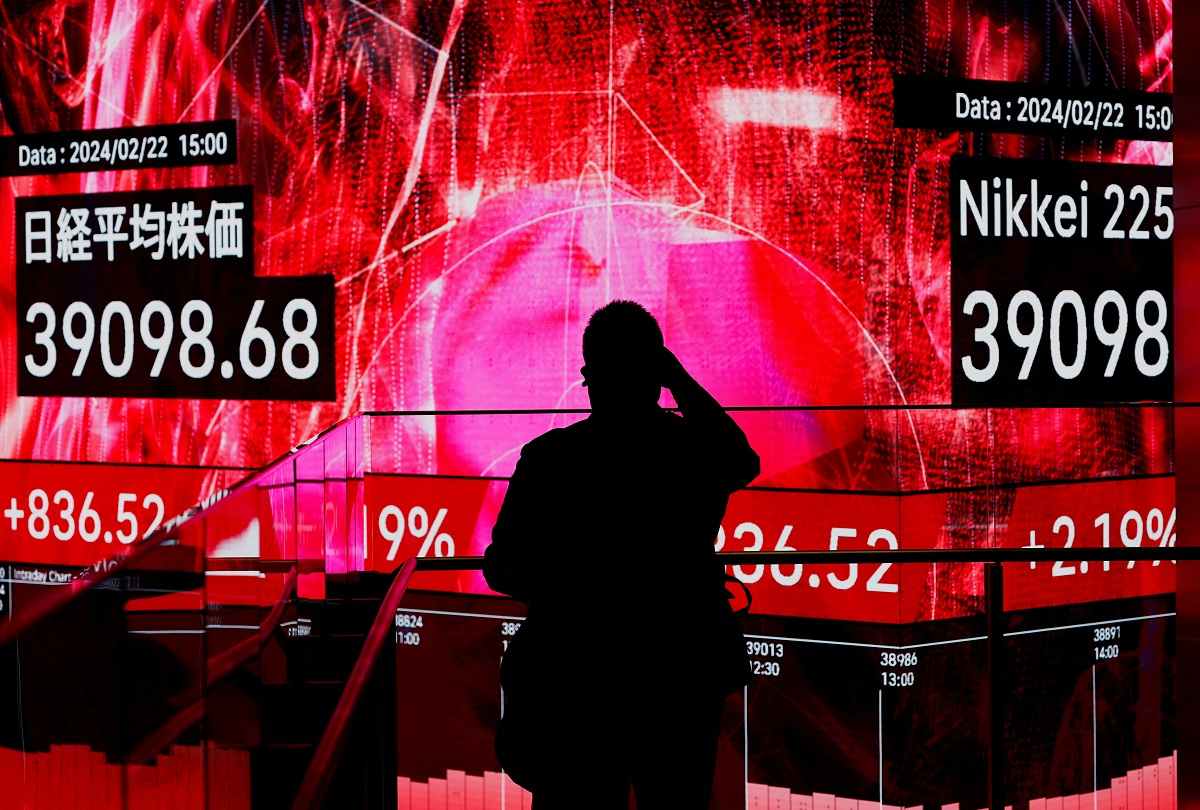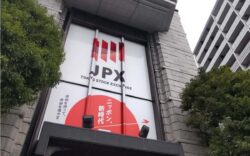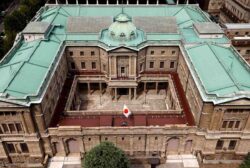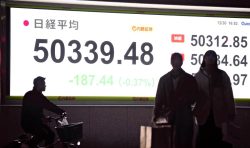
A visitor using his smartphone takes photos of an electronic screen displaying Japan’s Nikkei share average, which surged past an all-time record high scaled in December 1989, inside a building in Tokyo, Japan February 22, 2024.
9:26 JST, February 22, 2024 (updated at 17:45 JST)
The Nikkei 225 stock average finished Thursday at an all-time closing high of 39,098.68, breaking the previous record of 38,915.87, which was set during the bubble economy period on Dec. 29, 1989.
The Nikkei 225 rose immediately after the start of morning trading on Thursday, and in the afternoon session it reached 39,156.97, surpassing its all-time session high of 38,957.44, which was also set on Dec. 29, 1989.
The Tokyo Stock Exchange saw buy orders swell for semiconductor-related stocks on Thursday, after U.S. semiconductor giant Nvidia Corp.’s earnings results announced before the start of trading exceeded market expectations. With the yen hovering around ¥150 to the dollar, buy orders also focused on export-related stocks such as automobiles.
Commenting during trading on the new session high, Nomura Securities Co. Strategist Kazuo Kamitani said: “This is no more than a waypoint. Currently, only a limited number of semiconductor and export-related companies are pushing the index higher, but the key will be whether other companies [in other sectors] can follow suit.”
The Nikkei 225 started the year in the 33,200 range and has risen more than 5,000 points in just over a month and a half.
A major factor pushing up the stock price is the strong corporate performance driven by the weak yen and strong U.S. dollar, and the increase in foreign visitors to Japan. The total final profits of TSE-listed companies for the current fiscal year ending March 31 are expected to reach record highs for the third consecutive year. In addition, the Nippon Individual Savings Account (NISA) tax-exemption program for small-lot investments that started in January has been attracting funds into the stock market.
The Nikkei 225 fell into a prolonged slump after reaching its previous all-time high at the end of 1989. The 1991 bursting of the bubble economy pushed major financial institutions into bankruptcy, weakening the economy. In March 2009, the year after the collapse of Lehman Brothers, the index saw its lowest closing price of the post-bubble economy, at 7,054.98.
The inauguration of Prime Minister Shinzo Abe’s second Cabinet in December 2012 led to a rise in stock prices. Supported by the Bank of Japan’s massive monetary easing measures initiated in April 2013, the market entered an upward phase known as the “Abenomics market.” Although the market temporarily declined due to the COVID-19 pandemic, it had been on an upward trend since last year.
Top Articles in Business
-

Prudential Life Insurance Plans to Fully Compensate for Damages Caused by Fraudulent Actions Without Waiting for Third-Party Committee Review
-

Narita Airport, Startup in Japan Demonstrate Machine to Compress Clothes for Tourists to Prevent People from Abandoning Suitcases
-

Japan, U.S. Name 3 Inaugural Investment Projects; Reached Agreement After Considerable Difficulty
-

Toyota Motor Group Firm to Sell Clean Energy Greenhouses for Strawberries
-

SoftBank Launches AI Service for Call Centers That Converts Harsh Customer Voices into Softer Voices
JN ACCESS RANKING
-

Japan PM Takaichi’s Cabinet Resigns en Masse
-

Japan Institute to Use Domestic Commercial Optical Lattice Clock to Set Japan Standard Time
-

Israeli Ambassador to Japan Speaks about Japan’s Role in the Reconstruction of Gaza
-

Man Infected with Measles Reportedly Dined at Restaurant in Tokyo Station
-

Videos Plagiarized, Reposted with False Subtitles Claiming ‘Ryukyu Belongs to China’; Anti-China False Information Also Posted in Japan






















